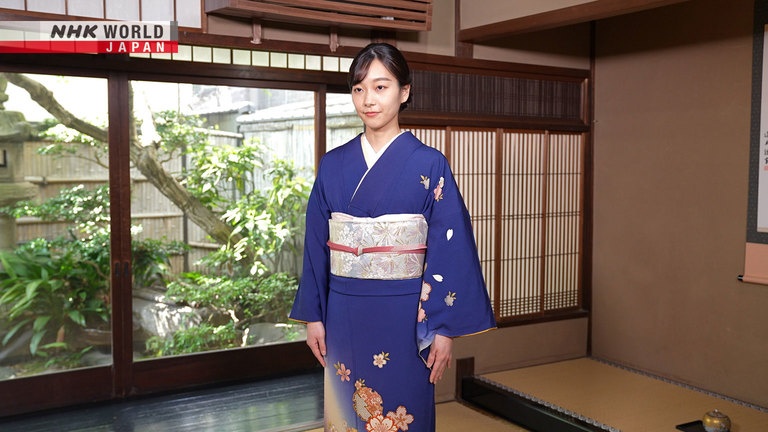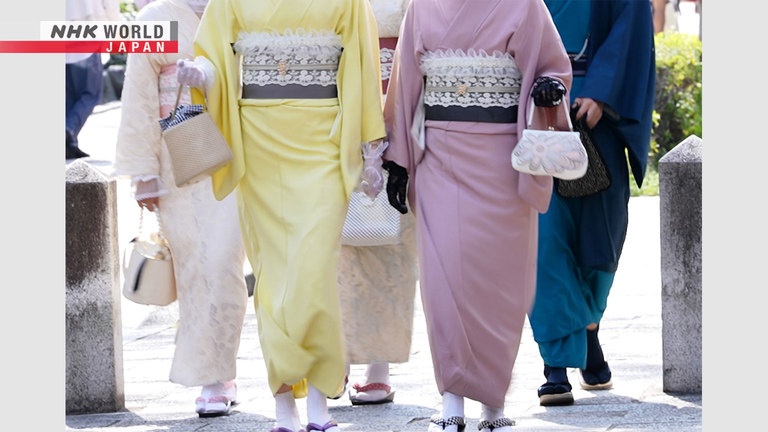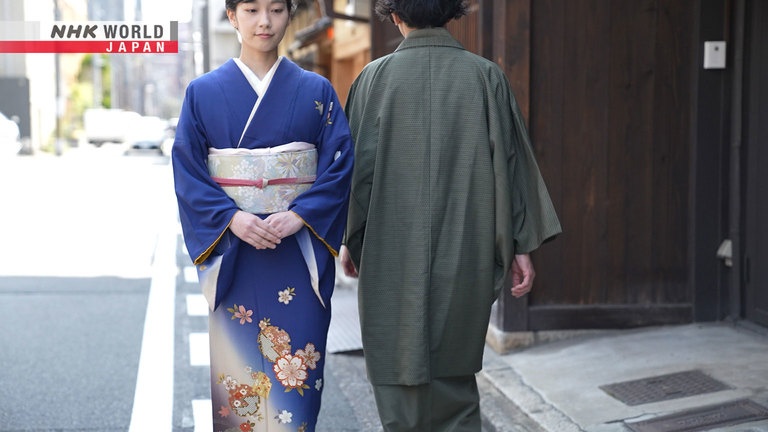Kimono
The Japanese language is rich in words and expressions influenced by nature, history and culture. This episode introduces words related to the kimono. Once used as everyday wear, the traditional and iconic garment is now generally reserved for special occasions. From his home in Kyoto Prefecture, poet and literary translator Peter MacMillan guides us through these words and the culture behind them.



Transcript
"Yukigesho" "Karakurenai"
The Japanese language is rich in unique expressions that reflect nature and culture.
Magical Japanese Today's theme is "Kimono."
The kimono is the national costume of Japan.
It was used for everyday wear until the Japanese adopted western-style clothing.
Now generally reserved for special occasions or important events, the kimono remains an essential part of Japanese culture.
We'll explore how this beautiful and iconic Japanese garment gave rise to different words and expressions.
Leading the way is our guide.
Hello, I'm Peter MacMillan.
Peter MacMillan is a poet and literary translator.
Originally from Ireland, he has lived in Japan for more than 30 years.
In 2008, he won awards in both Japan and the US for his translation of a collection of classical Japanese poems.
The kimono that I'm wearing now is very simple, but oftentimes kimono are truly gorgeous with a variety of flower patterns and bird patterns, etc.
Nowadays, kimono is seen in the way we might look at a dress or suit in the West like formal wear or one's best clothes.
In modern Japan, kimono are worn at events such as those celebrating the growth of children and on coming-of-age day.
Let's first have a look at some words that derive from the various parts of a kimono.
"futokoro ga fukai" Futokoro is a pocket-like space created in the front area of a kimono.
People would keep money, letters, or other valuables here.
Fukai means "deep."
"Futokoro ga fukai" describes a broad-minded and tolerant person.
"futokoro ga fukai" Futokoro can also mean the money one has on hand.
If you say, "one's breast pocket is warm" (futokoro ga atatakai), it means that you are rich.
By contrast, if you say, "one's inside pocket is cold" (futokoro ga samui), it means that you are poor.
"futokoro ga atatakai" "futokoro ga samui"
"hashoru" This comes from the phrase "hashi o oru," which is to fold up a kimono to adjust its length.
It means to cut short an explanation or a long story.
"hashoru" "boro ga deru"
Boro refers to a tattered cloth or garment.
It can also mean a fault or shortcoming.
Deru means to come out.
"Boro ga deru" is used when a fault that had been concealed becomes exposed, like a dirty garment accidentally peeking out from behind a kimono.
"boro ga deru" The prototype for kimono is a garment called kosode.
Kosode first appeared in the late Heian period and was worn as an undergarment by aristocrats.
Meanwhile, commoners wore it as a standalone, everyday garment, and it eventually came to be called kimono, which literally means "thing to wear."
Let's have a look at a waka poem related to kimono.
With so many troubled thoughts,
I could not really dance the Blue Waves Dance,
but in the swaying of my sleeves
could you read the turbulent waves
pounding within my heart?
In ancient Japan, "waving one's sleeve" (sode o furu) was an important signal, used when reluctantly parting from someone, or to show your love for someone.
Originally, waving one's sleeve was used as a kind of spell to calm a person's soul.
One would also wave their sleeves when seeing someone off as a magical way to pray for safety on their journey.
There are in fact many idioms related to sleeves in Japanese.
"sode o tsuraneru" This expression evokes the image of kimono sleeves lined up in a row and describes people moving or taking action as a group.
"sode o tsuraneru" "sode o hiku"
Hiku means to pull or tug.
Sode o hiku describes tugging someone's sleeve to get their attention, or as a reminder or warning.
Rather than a sharp yank, it's done discreetly to avoid drawing attention or causing embarrassment such as when alerting your date or friend that you want to leave a party.
"sode o hiku" "nai sode wa furenu"
This literally means "you cannot shake a sleeve you don't have."
It's used when someone can't afford something or doesn't have the means to deal with a given situation.
This is close to the English expression, "You can't get blood out of a stone," or, "A man cannot give what he hasn't got."
It's fascinating that this is expressed using the Japanese word for "sleeve."
"nai sode wa furenu" While the magical use of sleeves no longer exists in modern day Japanese culture,
it's very interesting to me that there are still so many words and phrases related to sleeves.
This is my favorite saying related to sleeves.
"sode furiau mo tasho no en" This translates as "even the brushing of sleeves in passing is a connection from another life."
It suggests that even the smallest details or briefest meetings are predestined by fate.
When I first heard this expression, I thought that "tasho" was the meaning of another word with the same pronunciation meaning "some," that is, "We have a connection with everyone with whom we brush our sleeves," which also makes sense,
so I was deeply moved when I realized that the word was "tasho" meaning another life.
It makes me feel the connectedness of all things in nature, animals, humans, of the whole world and it's actually a deep call for peace and harmony in the world.
"sode furiau mo tasho no en" I hope you enjoyed the program and that one day you too will have the chance to wear a kimono.
It will be a truly wonderful experience.
Goodbye for now.
See you next time.